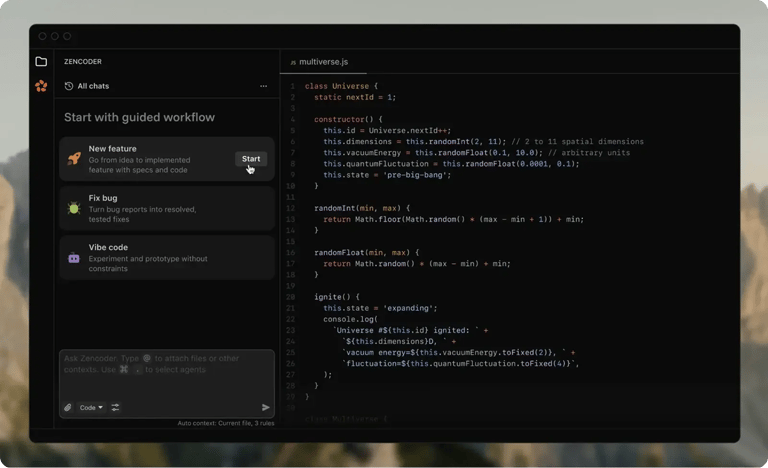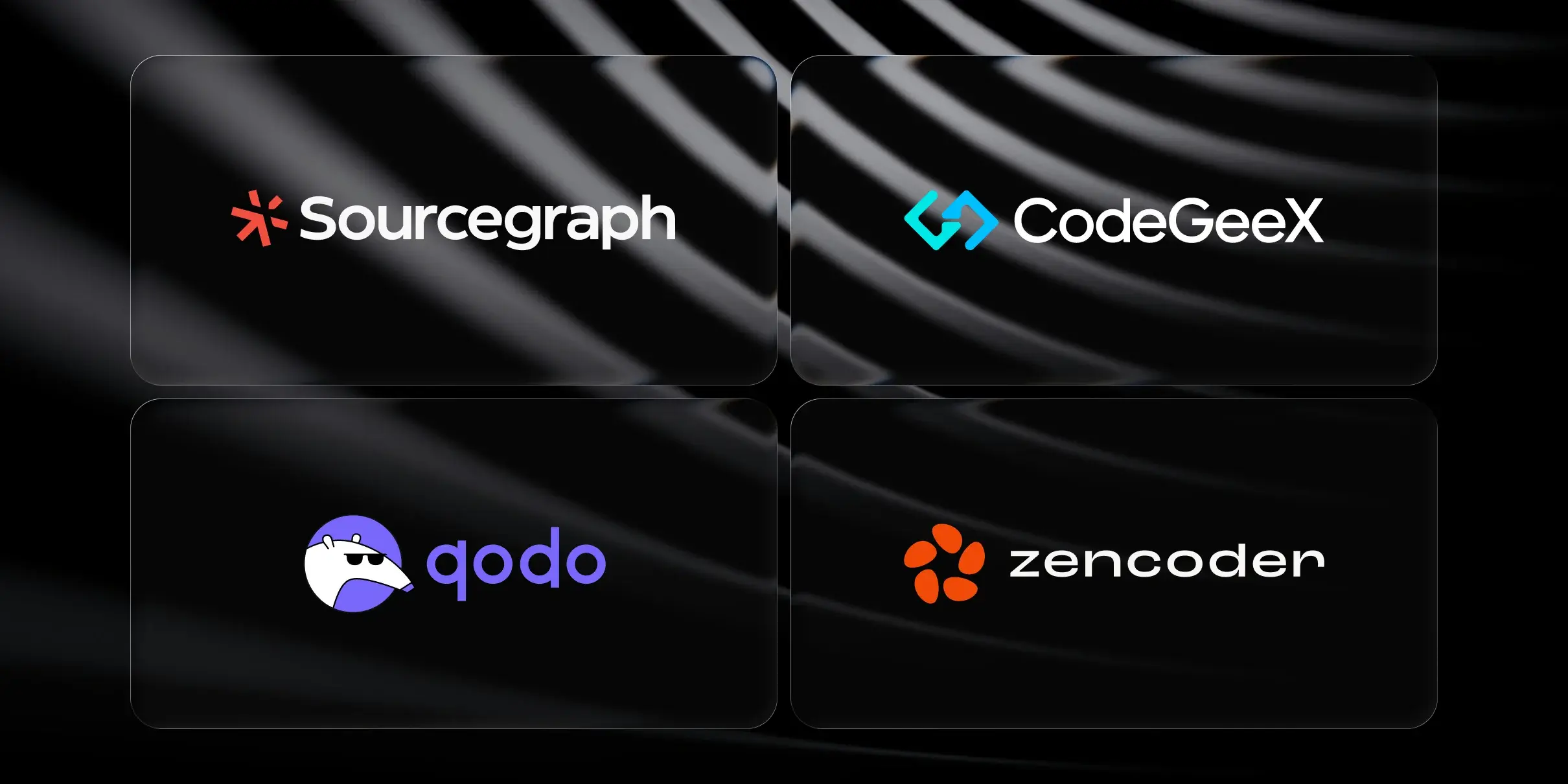AI has made its way into every corner of our digital lives, and software development is no exception. It's becoming increasingly rare to find a development process that doesn't involve AI in some capacity. One report suggests that nearly half of all code in 2025 was AI-generated or assisted.
AI code generators use machine learning to assist developers in ways we might not have imagined just a few years ago. They're not just churning out simple code snippets; they're streamlining workflows, catching errors before they become headaches, and helping developers get their products to market faster.
As this technology keeps evolving, it's becoming clear that AI code generators are more than novelties. They've changed how we approach software development and will continue to do so. This article will take a closer look at these tools and their impact.
The Evolution of Software Development
The journey of software development has been marked by continuous evolution. Each advancement has aided efficiency and accessibility—from the early assembly language and punch cards to the sophisticated languages and integrated development environments (IDEs) we use today.
- In the early days, coding was a labor-intensive process involving low-level programming languages.
- It became easier and more accessible with high-level languages like FORTRAN (1957) and COBOL (1959).
- The 1980s and 90s introduced object-oriented programming and visual development environments, further simplifying development.
- The rise of the internet and open-source communities in the 2000s democratized access to development tools and knowledge.
- The latest phase in this evolution is the integration of AI into software development. Coupled with DevOps dashboards, this integration allows teams to monitor and manage software development more effectively, ensuring smoother deployments and quicker issue resolution.
AI code generators are the culmination of decades of progress, combining the power of machine learning with the intricacies of coding. These tools can understand and generate human-like code, acting as powerful allies for developers.
Today’s tools go beyond simple pattern matching. They understand code semantics, programming paradigms, and even project-specific conventions. This level of sophistication allows them to suggest entire functions, implement complex algorithms, and even assist in architectural decisions.
Benefits of AI Code Generators
Developers typically juggle many responsibilities. AI tools can help them code more efficiently, consistently, and accurately.
Fewer Errors
Human error is inevitable in manual coding. Even experienced developers make mistakes, from simple syntax errors to more subtle logic flaws. These errors can lead to bugs, security vulnerabilities, and system crashes.
AI code generators can significantly reduce the incidence of human error. By leveraging machine learning models trained on vast codebases, these tools can generate highly reliable code that adheres to best practices. They also include built-in mechanisms to identify and correct mistakes automatically.
Consistency and Standardization
AI code generation tools can adhere to standards and maintain consistency across codebases. This not only reduces errors but also makes the code more readable and maintainable. As a result, team members can easily understand and work with each other's code.
Overall, standardized code is easier to review, test, and debug, leading to higher-quality software.
Documentation and API References
Many AI code generation tools can automatically generate documentation and API references, providing detailed information on how to integrate and use the tools effectively.
For example, documentation strings offer a quick reference to understand what each piece of code does without reading the whole implementation. This improves code readability and makes updating or modifying code much smoother.
Continuous Improvement
Based on their training, AI models can recognize common coding errors and patterns that lead to bugs. They learn from past mistakes and can preemptively avoid these pitfalls, producing more robust and reliable code. This continuous learning and improvement cycle ensures that the quality of generated code improves over time.
Besides improving their own code quality, AI coding tools can inspire change in their users. For example, Zencoder has embedded AI coding agents that can act as intelligent pair programmers. They can offer alternative implementations, point out potential optimizations, and even suggest test cases.
Efficiency and Productivity Gains
Traditional coding without any AI code generation can be time-consuming. It often requires painstaking attention to detail and involves repetitive tasks.
For example, let’s say you’re implementing a sorting algorithm or setting up a database connection. While these tasks are fundamental, they often consume valuable time. AI code generators can produce these code snippets in seconds, complete with error handling, docstrings, and best practices.
Similarly, developers can save time by integrating ready-to-use solutions, such as VPN software, which ensures secure connections without the need to build complex security protocols from scratch.
According to some reports, AI tools can boost productivity by around 30% and lead to a 33–36% time reduction for coding-related tasks. The percentages are likely higher for companies leveraging custom AI development.
However, the benefits don’t end with faster development. With more time on their hands, developers can maintain their creative flow and focus on unique challenges, such as strategy and innovation.

Source: WebOsmotic
Success Story — AI’s Proven Impact on Mobile Development Teams
A case study from the Technical University of Cluj-Napoca illustrates the effects of AI code generators on real-world mobile development teams.
The study involved 16 participants working on native mobile applications in Kotlin and Swift. It evaluated the effect of AI tools like GitHub Copilot and ChatGPT on technical onboarding and transitioning between technical stacks.
Participants were tasked with solving development problems with and without AI assistance. The study measured completion time, correctness, and a unique metric called ReviewerScore, which evaluated how well the generated code integrates with industry standards.
Results showed significant improvement in task completion time and correctness when using AI tools. Additionally, 72% of participants rated the AI tools as highly helpful, and 66% expressed high confidence in the final code generated with AI assistance.
Best AI Code Generators in 2025
Various paid and free AI code generation tools exist today. Some of the most prevalent types include:
- IDEs that provide AI capabilities to existing editors
- AI-native IDEs with fully integrated development environments
- Agentic AI platforms that can complete complex tasks autonomously
- Chatbots offering conversation-style coding assistance
AI coding tools also vary in terms of ecosystem compatibility, cost, and ease of use. Also, some tools can be easily integrated into your workflow, while others require a complex and costly setup. To choose the best AI code generator, you should first consider your needs and use cases.
The table below breaks down the most popular options as of late 2025:
|
AI Code Generator
|
Type
|
Best for
|
|
Zencoder
|
IDE extension + autonomous agents
|
Teams seeking high output quality and customization
|
|
GitHub Copilot
|
IDE extension + autonomous agents
|
Broad language support and teams already in the GitHub ecosystem
|
|
Amazon Q Developer
|
IDE extension
|
Teams in the AWS ecosystem
|
|
Gemini Code Assist
|
IDE extension
|
Teams using Google Cloud and Firebase workflows
|
|
Tabnine
|
IDE extension
|
Companies with strict data privacy requirements
|
|
Cursor
|
AI-native IDE
|
Deep codebase awareness and complex, multi-file editing
|
|
OpenAI Codex
(2025 version)
|
Autonomous agent
|
Building features and apps from natural language prompts
|
|
JetBrains AI Assistant
|
IDE extension
|
Teams already using IntelliJ, PyCharm, or other JetBrains IDEs
|
|
Replit
|
Cloud-based IDE
|
Fast prototyping, learning, and collaborative coding
|
|
ChatGPT
|
Chatbot
|
Conversational debugging, code explanations, and learning
|
Why Zencoder Stands Out
Zencoder is an agent-based AI coding platform that produces contextual, compile-ready code with fewer errors than other AI tools. Some of its main benefits include:
- Embedded agents: Zencoder offers embedded agents that can analyze your repository structure and refine the output iteratively using syntactic and semantic analysis.
- Repo Grokking: It can conduct deep analysis of your entire codebase, and thus understand project context, patterns, and conventions.
- Agentic repair: Zencoder has an automated pipeline that analyzes, fixes, and fine-tunes generated code.
- Test generation: To improve reliability and coverage, Zencoder can create unit tests alongside code automatically.
- Ease of use: Zencoder offers an intuitive interface and seamless integration with popular IDEs and DevOps tooling.

Source: Zencoder
Limitations of Current AI Code Generation Technology
While the benefits are clear, the integration of AI into development workflows may present some challenges.
The quality of AI-generated code is heavily dependent on the training data. On one hand, using high-quality, well-reviewed codebases for training can lead to reliable output that requires minimal oversight.
On the other hand, tools trained on low-quality codebases will produce unreliable results. If not reviewed thoroughly, such code can cause problems down the line—bugs, technical debt, security issues, production delays—and eventually lead to loss of profit and reputational damage.
Issues With Code Quality and Efficiency
Even if advanced, AI code generators sometimes produce code that is syntactically correct but logically flawed or inefficient.
“I'm very bullish on very good developers augmenting with AI. I'm not super bullish on newish developers augmenting with AI because they tend to just get lied to by the model.” — says William Falcon, the creator of PyTorch Lightning, in conversation with Stack Overflow.
This is not to say that AI tools aren’t beginner-friendly. They’re excellent for helping newcomers get up to speed with real-world programming scenarios and familiarizing them with the programming languages.
But it comes down to one’s understanding of the programming language and code patterns. An inexperienced software engineer may not be able to perform due diligence needed to ensure quality code.
Lack of Adherence to Standards
Another critical aspect is ensuring that AI-generated code adheres to project-specific standards and architectural patterns.
Advanced AI systems are now being trained to recognize and adapt to different coding styles and project structures, making them more versatile across various development environments. Still, full context awareness—understanding how new code fits into a larger system—remains a work in progress.
Security Concerns
A 2024 study by CEST indicates that over 48% of AI-generated code contains security vulnerabilities.
Common vulnerabilities include SQL injection, cross-site scripting (XSS), and buffer overflows. Some AI code generators now include vulnerability detection features to catch these issues, but thorough security testing and human review remain essential.
How To Improve the Quality of AI-Generated Code
Today’s AI code generators often come with sophisticated code validation mechanisms. For example, some tools include static code analysis that checks for common coding errors and performance bottlenecks. Additionally, some systems can provide explanations for their suggestions, enabling developers to understand and validate the AI's reasoning.
Still, these measures are not enough to rule out errors and other issues—thorough oversight and review are necessary. These steps can help you get better results with AI code generators:
Incorporating Feedback Loops
Feedback loops are crucial for continuous improvement. Developers should provide feedback on generated code, highlighting areas for improvement and identifying errors. This feedback can be used to retrain and fine-tune the AI model, resulting in progressively better code generation.
Code Review and Testing
Despite the capabilities of AI code generators, code review and testing remain essential. Developers should review generated code to ensure it meets quality standards and aligns with project requirements. Rigorous testing—including unit tests, integration tests, and security assessments—can help validate the code’s functionality and reliability.
Collaboration with AI
Developers should collaborate with AI code generators, treating them as partners in the development process.
Understanding the strengths and limitations of the AI tool allows you to leverage its capabilities effectively. This ensures that AI-generated code complements human efforts and enhances overall productivity.

Source: Early
Will AI Code Generators Replace Programmers?
The rise of AI code generators, especially generative coding platforms, has sparked concerns about the future of the developer’s role. While these tools are growing more powerful and will inevitably change how developers work, they are not going to replace humans anytime soon.
Augmentation, Not Replacement
AI code generators are best viewed as tools that augment human capabilities rather than replace them. They handle repetitive and mundane tasks, allowing developers to work more efficiently and freeing them to focus on creative and strategic work.
It's similar to how spreadsheets changed accounting. Accountants can do far more with spreadsheets than they ever could with ledgers, but their role remains critical.
The Need for Human Creativity
Software development isn’t just writing code. It involves problem-solving, design thinking, and creativity.
Human developers bring unique perspectives and innovative solutions to complex problems. AI code generators, while adept at producing code, lack the ability to think creatively and understand the broader context of a project.
Continuous Learning and Adaptation
New software development technologies, frameworks, and paradigms are constantly emerging. Human developers adapt to these changes naturally, whereas AI code generators require continuous training and updates to keep pace. Human oversight ensures that AI-generated code remains relevant and up-to-date.
What’s Next for AI Code Generators?
Many capabilities once considered futuristic are now standard. Today's AI tools can translate natural language into functional code, generate test suites automatically, detect vulnerabilities, and suggest refactoring strategies.
In the near future, we can expect advancements such as greater autonomy and deeper integration across all development stages. Further ahead, AI may even play a crucial role in emerging technologies like quantum computing, potentially revolutionizing fields like cryptography, complex system simulation, and real-time data processing.
Deeper Integration Across the Development Lifecycle
AI code generators already integrate with IDEs, providing real-time suggestions, error detection, and code improvements. The next step is seamless integration into CI/CD pipelines, deployment systems, and testing frameworks.
Higher Autonomy for Complex Tasks
Future AI code generators will be able to manage more complex tasks spanning multiple files, services, and repositories. They’ll also have advanced verification systems and provide more reliable code, requiring less oversight and fewer corrections.
Greater Specialization and Adaptability
AI coding tools will become more specialized and offer greater customization. They’ll also be more adaptable and adept at learning from individual developer preferences and coding styles. Collaboration will likely become more natural and efficient across the whole development process.
Key Takeaways
- AI code generators are a transformative force in the field of software development.
- Besides generating code, AI tools can write tests and documentation, review code, and learn from developer feedback.
- Developers who use AI code generators benefit from enhanced efficiency, fewer errors, and faster time-to-market.
- Still, AI code isn’t perfect. Teams using it need to conduct thorough reviews to remove any bugs, inefficiencies, and security threats.
- AI code generators won’t replace humans. Instead, they will reduce manual labor and free their time for innovation and strategy.
- Future AI coding tools will be more autonomous, adaptable, and integrated across the software development lifecycle.
Frequently Asked Questions
Can AI Code Generators Write Entire Programs?
While AI code generators excel at generating code snippets and functions, writing entire programs autonomously remains a challenge. Current AI models excel at specific, well-defined tasks but struggle with complex, large-scale projects that require deep understanding and technical architecture planning.
Should Beginner Programmers Use AI Code Generators?
Yes and no. On one hand, AI code generators can help new developers learn and advance. On the other hand, beginners may not be able to identify when AI code is incorrect or inefficient.
The ideal approach would be to understand the fundamentals first and then use AI to enhance skills, not as a substitute for them.
Is AI-Generated Code Secure?
AI tools often produce code with security vulnerabilities. One report suggests that about half of AI-generated code contains them. It’s important to treat AI code as an initial draft and review it thoroughly before merging.
However, some tools employ mechanisms to ensure better and more secure code. For example, Zencoder uses an agentic repair pipeline to detect and fix issues in real time. It can also generate unit tests automatically and analyze your codebase to understand context. The result is cleaner code that requires minimal oversight.

Source: Zencoder
Ready to write more reliable code without hours of manual work? Sign up for Zencoder and see the difference.








![Spec-Driven Development: Everything You Need to Know [2026]](https://zencoder.ai/hubfs/Cover-Feb-17-2026-08-47-58-1236-PM.webp)

